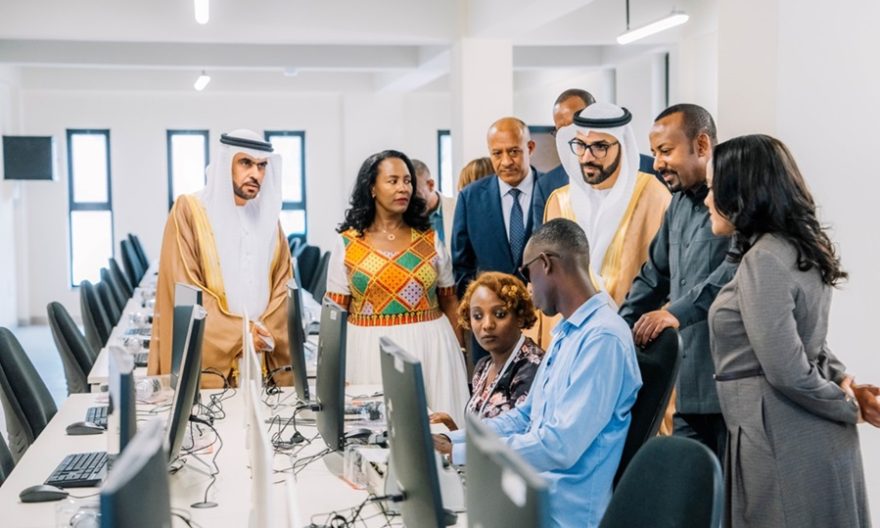
In Ethiopia, like many countries around the world, visually impaired individuals face numerous challenges in their day to day activities. From navigating public spaces to accessing educational resources, there are many barriers that can limit the potential of these segments of the society to actively and fully participate in the development of the country and contribute meaningfully.
Visually impaired individuals in Ethiopia often encounter a lack of accessibility in public spaces, such as sidewalks, buildings, and transportation aside from facing social stigma and discrimination, which can hinder their integration into society. Misconceptions and prejudices also expose them to limited opportunities and exclusion from various aspects of life.
Without proper accommodations, navigating these spaces can be more challenging and even dangerous for individuals with visual impairments. Additionally, many visually impaired individuals face barriers to accessing education and employment opportunities, further limiting their ability to fully participate in society.
As many people agreed, addressing key areas such as access to education and employment, enhancing infrastructure and public spaces, advocating for inclusive policies, promoting social inclusion, leveraging technology for empowerment, and building support networks are important steps to create a better future not only for visually impaired persons but also for those people with different types of disabilities.
More importantly, understanding the challenges faced by visually impaired persons should be given due attention towards motivating them to actively participate in the community.
Thus, pertinent stakeholders should work proactively to easing the barriers to education for visually impaired individuals for the reason that in most cases more than a few visually impaired individuals encounter barriers to accessing quality education in Ethiopia. Without adequate resources and support, they struggle to receive proper education which in turn limits their potential for personal and professional growth.
Recently, Prime Minister Abiy Ahmed has inaugurated ‘Sheikha Fatima Bint Mubark Blind Boarding School’ built in Addis Ababa by the Office of the First Lady for visually impaired persons. The Boarding School was built with the support obtained from Sheikha Fatima, the mother of Sheihk Mohamed bin Zayed, the President of the United Arab Emirates (UAE).
The school, which will receive students of grade 9 to 12, encompasses vital services that are convenient for visually impaired students including classrooms, cafeteria, library and other state of the art facilities.
Inaugurating the school, Prime Minister Abiy said that the Office of The First Lady has previously built 34 schools across the country that are mainly rendering services to people with low income.
“On the occasion of the inauguration of the Sheika Fatima Bint Mubarak School for the Blind, I would like to extend my congratulations to First Lady Zinash Tayachew for the fruition of a citizen-centered establishments putting the vulnerable at heart, as well as the success of the schools built throughout the nation through the Office of the First Lady,” the Premier stated.
Learning from the success of this school for the blind, Abiy stressed the need to make sure that the city infrastructure, built in the country to give due attention to the needs of those with disabilities.
The newly inaugurated state of the art and very unique boarding school will receive more than 300 blind students from across the country, the Premier said.
Noting that the government’s development projects focus on citizens with low income, Abiy affirmed that development projects, being carried out in Ethiopia aimed at benefiting citizens with low income, will continue to intensify.
He also extended gratitude to Sheika Fatima Bint Mubarak for the support extended to this noble cause.
First Lady Zinash Tayachew for her part said that the development projects being undertaken by the Office of the First Lady aim at easing the burden of the low income segment of the society.
She extended gratitude to all that contributed to the successful implementation of the project, including Sheikha Ftima.
Representing Sheikha Fatima, Humanity Department Chancellor of Mohamed Bin Zayed University for Humanities Khalifa Mubarek said that UAE and Ethiopia are enjoying strong bilateral relations and the newly inaugurated boarding school is the manifestation of this cordial partnership.
The bilateral relations of the two countries have been strengthening particularly following the official visit made by President Sheihk Mohamed bin Zayed in 2018 to Ethiopia.
What is more, creating an inclusive environment for visually impaired individuals in Ethiopia involves more than just physical accommodations. It is about fostering a sense of belonging and active participation in society. By building supportive communities and networks, we can ensure that visually impaired individuals have the resources and connections they need to thrive.
Raising awareness about the challenges faced by visually impaired persons is also essential for fostering empathy and understanding within the community. Through education and advocacy efforts, we can break down barriers that prevent visually impaired individuals from fully participating in society and promote inclusivity.
During this digital era, technology has also the power to transform the lives of visually impaired individuals by providing them with tools and resources to enhance their independence and quality of life. By embracing assistive technology and arranging training programs for digital literacy, we can empower visually impaired persons to navigate the modern world with confidence.
Therefore, addressing policy gaps and advocating for inclusive practices are crucial steps in creating a more inclusive environment for visually impaired individuals. Through collaborative efforts and advocacy initiatives, positive changes can be made to ensure their rights and needs are met.
To this end, creating an inclusive environment for visually impaired persons requires a collective effort from individuals, businesses, and policymakers. For that reason, promoting accessibility, raising awareness, providing support services, collaborating on advocacy efforts, and empowering individuals, immensely contributes towards creating a more inclusive society where everyone has the opportunity to thrive. Thus, let’s come together to make Ethiopia a more inclusive and accessible place for all its citizens.
BY TEWODROS KASSA
The Ethiopian herald May 26/2024





